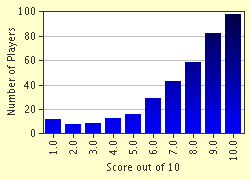Quiz Answer Key and Fun Facts
1. A verb meaning to aid or assist becomes a wager when a space is added after the "a". What is the verb?
2. This word beginning in "a" is the past tense of a verb meaning to get up. Put a space after the "a" and you have a fragrant flower. What is the verb?
3. This adverb means swiftly but transforms to a phrase that designates a step taken in walking when a space is placed after the "a". What is the adverb?
4. A verb meaning astonish becomes a labyrinth when a space is placed after the "a". What is the verb?
5. When a space is placed after the "a" at the beginning, a verb meaning to stand against or support becomes a phrase denoting a particular conjunction. What is the verb?
6. An old Latin word meaning to stare stupidly, evolved into verb that means entertain or evoke a humorous response. If a space is added after the "a" that begins this word, we have a phrase which denotes a source of inspiration (or one of nine particular daughters of Zeus). What is this verb?
7. A verb that can mean to settle down upon becomes a phrase that provides illumination when a space is placed after the "a" that begins the verb. What is the verb?
8. Without a space, these six letters beginning in "a" can mean floating freely without anchor. Put a space after the "a", and you might have a collection of snow. What is the six letter word?
9. An adverb meaning to be alongside becomes a mammary gland when a space is put after the "a" at the beginning. What is the adverb?
10. Keep these five letters starting with "a" together, and it could imply that events are in motion. With a space after the "a", you have something that belongs in a shoe. What is the five-letter word?
Source: Author
uglybird
This quiz was reviewed by FunTrivia editor
Bruyere before going online.
Any errors found in FunTrivia content are routinely corrected through our feedback system.

